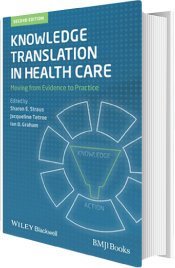In clinical settings, the implementation of knowledge depends on the exchange of information between health care providers and patients, where research evidence is used to support clinical decisions. The ideal pathway for knowledge translation in this context is the sharing of decisions between a health care provider and a patient, a process known as “shared decision making” (SDM). A systematic review posited that three elements must be present for SDM to occur:
- both the health care provider and the patient must acknowledge that a decision is needed;
- they must both know and understand the best available evidence concerning the risks and benefits of every option; and
- when making a decision, they must consider not only the clinician’s recommendations but also the patient’s values and preferences.
In this way, we see that SDM requires not only that the best evidence be considered and the patient’s values and preferences be taken into account, but also that the information exchange between members of the decision-making dyad is bidirectional. Shared decision making does not assume that the health care provider is the only party who needs access to evidence in order for patients to experience evidence-based practice; rather, it assumes that both the health care provider and the patient need access to the best evidence.

